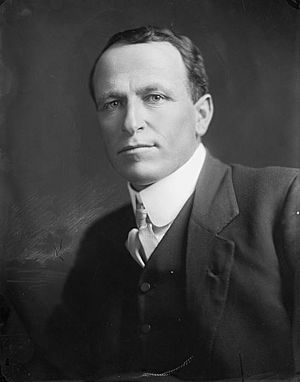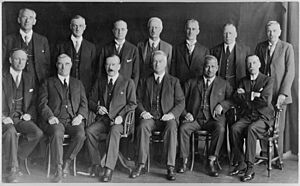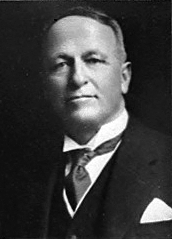Harry Atmore facts for kids
Quick facts for kids
Harry Atmore
|
|
|---|---|
 |
|
| 19th Minister of Education | |
| In office 10 December 1928 – 22 September 1931 |
|
| Prime Minister | Joseph Ward |
| Preceded by | Robert Wright |
| Succeeded by | Robert Masters |
| Member of the New Zealand Parliament for Nelson |
|
| In office 19 December 1911 – 11 December 1914 |
|
| Preceded by | John Graham |
| Succeeded by | Thomas Field |
| In office 17 December 1919 – 20 August 1946 |
|
| Preceded by | Thomas Field |
| Succeeded by | Edgar Neale |
| Personal details | |
| Born | 14 December 1870 Nelson, New Zealand |
| Died | 20 August 1946 (aged 75) Nelson, New Zealand |
| Political party | Independent |
| Spouse |
Dorothy Annie Corrigan
(m. 1936) |
| Relations | James Randall Corrigan (father-in-law) |
| Profession | Signwriter |
Harry Atmore (born 14 December 1870, died 20 August 1946) was an important New Zealand politician. He was an Independent MP, meaning he didn't belong to a specific political party. He represented the Nelson area in the South Island.
Harry Atmore served as the MP for Nelson for a long time, a total of 30 years. He was an MP from 1911 to 1914, and then again from 1919 until he passed away in 1946. He also held important roles in the government. He was the Minister of Education and the Minister in charge of the Department of Scientific and Industrial Research (DSIR) from 1928 to 1931. For about five months, from August 1930 to January 1931, he even served as the acting Prime Minister of New Zealand.
Contents
Early Life and Local Work
Harry Atmore was born in Nelson in 1870. He went to a public school in Bridge Street, Nelson. When he was younger, he played rugby for his province.
Later, he moved to Wellington and spent eight years learning to be a signwriter and decorator. After finishing his training, he came back to Nelson and started his own business.
Atmore was very active in his local community. He was part of several important groups in Nelson, like the Education Board and the Hospital Board. In 1905, he was elected to the Nelson City Council. He also served on the board for Nelson College and the Cawthron Institute Trust Board.
Becoming a Member of Parliament
| New Zealand Parliament | ||||
| Years | Term | Electorate | Party | |
| 1911–14 | 18th | Nelson | Independent | |
| 1919–22 | 20th | Nelson | Independent | |
| 1922–25 | 21st | Nelson | Independent | |
| 1925–28 | 22nd | Nelson | Independent | |
| 1928–31 | 23rd | Nelson | Independent | |
| 1931–35 | 24th | Nelson | Independent | |
| 1935–38 | 25th | Nelson | Independent | |
| 1938–43 | 26th | Nelson | Independent | |
| 1943–46 | 27th | Nelson | Independent | |
Before becoming an MP, Atmore tried to win the Nelson seat in 1902, 1905, and 1908, but he didn't succeed. In 1911, he finally became Nelson's Member of Parliament. He was an independent politician, which meant he didn't always follow a party line. He believed that politicians should represent the people first, rather than their party.
Atmore lost his seat in the 1914 election. However, he returned to parliament in 1919.
After the 1928 election, Atmore supported the new United Party, which helped them form a government. Because of his support, he was given a job in the government as the Minister of Education.
Minister of Education
Harry Atmore was very passionate about education, even though he was mostly self-educated. He worked hard in his new role as Minister of Education. His main goal was to make sure every child in New Zealand had the chance to get a good education. He wanted them to be able to reach their full potential.
He set up a committee to look at the public education system. This led to the "Atmore Report" in 1930. This report suggested many big changes. Some of these ideas included:
- Making the school leaving age 15.
- Creating intermediate schools.
- Changing how students got into secondary school.
- Making the secondary school curriculum wider to include more subjects.
Atmore left his role as education minister in 1931. This was because the country was in a difficult economic time called the Great Depression. There were plans to cut funding for education, and he disagreed with these cuts.
Even though he resigned, many of his ideas from the Atmore Report were put into action later. This happened under the First Labour Government. Peter Fraser, who was on Atmore's committee, became the Minister of Education and helped make many of these changes happen.
Atmore was always thinking about solutions for New Zealand's problems. He believed it was important to know about big issues like how money worked and international events. He was found dead at his home on 20 August 1946, just two weeks after saying he wouldn't run for election again. He was buried in Wakapuaka Cemetery.
Personal Life
Harry Atmore was a well-known person in Nelson. He didn't drive a car; instead, he rode his bicycle everywhere. This made him a familiar sight in the community. He also personally replied to all messages and requests by hand. This showed how dedicated he was to his work.
Atmore married Dorothy Annie Corrigan on 24 June 1936, when he was 65 years old. They didn't have any children. Dorothy was wealthy and well-educated. They built a new home called Te Maunga, which became a welcoming place for many people. During World War II, both Harry and Dorothy were very involved in patriotic work. Dorothy even received an MBE award for her efforts. She lived for another 30 years after Harry passed away.
Harry Atmore was very popular in Nelson because he was so committed to the people he represented. He helped with many local issues, like getting a country school repaired and helping people find jobs. For a whole generation, Atmore worked hard for everyone in Nelson. His dedication made his constituents feel like he was a personal friend.
Legacy
In 1935, Harry Atmore was given the King George V Silver Jubilee Medal.
Historians see Atmore as one of the last examples of an older style of politics. This was before political parties became so strong. He represented the hopes of people in small towns who wanted a fairer society.
 | Shirley Ann Jackson |
 | Garett Morgan |
 | J. Ernest Wilkins Jr. |
 | Elijah McCoy |



